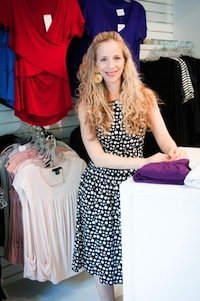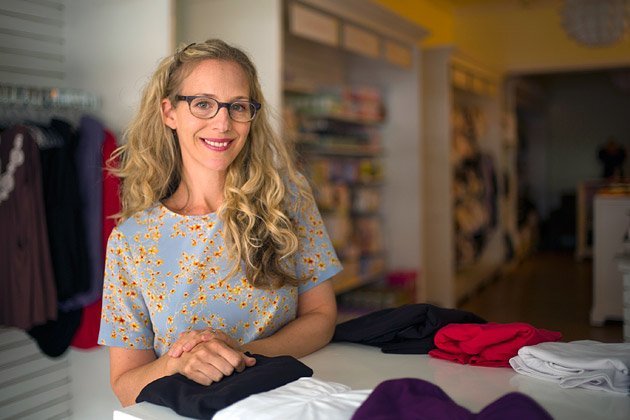
When Yummy Mummy founder Amanda Cole first started breastfeeding her now 5-year-old daughter, she ran into a few roadblocks. The products and supplies that she needed were scattered from store to store and across various websites, and she felt she didn’t have the support she needed. Getting acclimated with the complex choreography of baby feeding was a stressful experience for the first-time mom; so stressful, in fact, that she broke down in tears one day after realizing she purchased the wrong type of breast pump.
“My whole experience with getting breastfeeding products was so difficult. I thought, ‘Breastfeeding is hard enough. There has to be an easier way,’” remembers Cole, who also nursed her second child.
Cole made it her mission to help other breastfeeding mothers like herself and opened Yummy Mummy on the Upper East Side in May of 2009. With clear, user-friendly displays, knowledgeable staff members, and a welcoming environment, the boutique is dedicated to making breastfeeding a positive experience for women.
“There are oftentimes unexpected hurdles along the way,” Cole says. “And we’re just there to help and not judge—and to be support for you.”
Cole likes to refer to the store as a “one-stop shop” that has everything new or expectant moms need for breastfeeding, all conveniently located in one place. While about 80% of the products are geared toward breastfeeding moms—including breast pumps, nursing pillows, and nursing bras—Yummy Mummy offers items to suit just about any new mom’s needs, such as bottles, postpartum care products, and maternity clothing.
But you won’t find rattles or playmats on the shelves.
“A lot of the time I’ll get manufacturers who come and pitch different baby products,” Cole says. “[But] we try to stay true to it being all about mom.”
A great breastfeeding experience is about more than just the right supplies, of course. Having support and encouragement is just as important. In addition to providing all of the gear and equipment that moms need for breastfeeding, Yummy Mummy also offers various types of classes. Some of the more popular ones are Childbirth Preparation, Baby Safety & CPR, and Doula Speed Dating, in which expectant women meet five to ten doulas in one session, making the search for a labor coach relatively quick and easy.
The store’s most well-attended class, however, is the obvious choice: “A lot of moms have met their closest friends at our Breastfeeding Support Group,” Cole says. “They come here; their babies are the exact [same] age. They bond, they see each other weekly, and then they leave and go for lunch. I think some really nice friendships have formed.”
Although the store opened during the recession, the business has been steadily growing over the past four years. One recent boon for business has been the Affordable Care Act, which was signed into law last summer. The ACA requires that health insurance plans cover women’s preventative services, which includes breast pumps, breast pump supplies, counseling, and support. In fact, Yummy Mummy recently opened a call center—also on the Upper East Side—where they receive orders and ship breast pumps across the country every day.
“We’ve been working closely with different insurance plans to provide breast pumps to moms all over the country,” Cole says. By partnering with various companies, Yummy Mummy has made pumps more easily accessible through Aetna Health Insurance, Blue Shield – CA, Cigna, EmblemHealth (GHI and HIP), Empire Blue Cross Blue Shield, Humana, Lifewise, POMCO Group, and Premera Blue Cross—with plans to further expand in the near future.
While she spends a lot of time finding new and helpful products for moms, Cole says her favorite part of her job is still working with her clientele. “We have the best customers,” she says. “They’re so appreciative of all the services and products that we offer, and that makes us feel really good.”
Having eventually achieved breastfeeding bliss with both of her own children, Cole knows how important it is for a new mother to be supported through such a delicate choice. To that end, Cole says that Yummy Mummy’s focus always remains on the individual: the mom who needs some advice on what kind of breast pump to buy or how she can get her newborn to feed more efficiently.
“My biggest priority is just maintaining the same level of customer service that we’ve always had,” she adds. “I think that’s really what defines us.”





